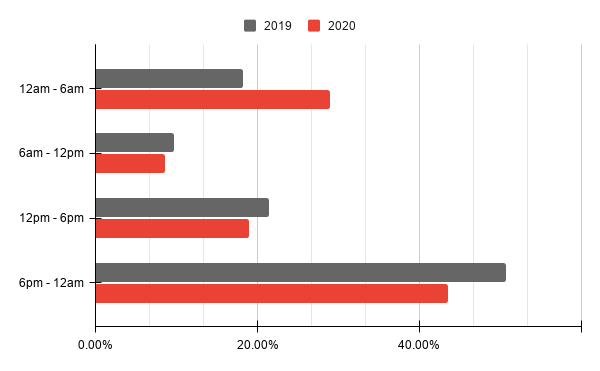Teen Life, Interrupted
It’s difficult to overstate the massive role that schools play in the lives of pre-teens and teens. Between academics, friends, sports, and rites of passage like prom and graduation, schools are the social and educational hub that provides a pathway to independence and adulthood. Schools also play a critical role as mental health providers.
So when schools across the country closed their doors last Spring, it upended the lives of over 75 million young people under 18, who were suddenly exposed to the increased mental health risks brought on by the pandemic. Adding to that grief and disappointment, COVID-19 infection and death rates soared against the backdrop of an economic recession, massive protests in response to the murder of George Floyd, and a polarizing Presidental Election. Teens had to absorb much of these society-wide stressors without being able to rely on the support systems of friends, teachers, coaches, and counselors who would have otherwise been available to them.
Crisis Text Line is in a unique position to study the experience of teens in crisis. By offering free, 24/7, confidential crisis counseling via text, our service predominantly attracts digital natives who are more comfortable texting for support. In 2020 48% of our texters were age 17 and under. Unlike most research on the subject of teen mental health, our data is based on revealed behavior, instead of self-reported perceptions and also includes the option to assess crisis counselors.
We are sharing four insights about teen mental health in 2020 to help policymakers, educators, journalists, and philanthropists who advocate, teach, and support teens to understand what prompts them to reach out for support.
1. Remote school is a major source of stress and anxiety.
The vocabulary of school-related conversations tells a story of overwhelming stress, where most of the words reference school work, failing, being behind, worrying about grades, and motivation. In these conversations, texters also used words that describe close relationships with friends, classmates, and family members. Some of the most frequent expressions used in school-related conversations were emojis, including a heart emoji, a smirking emoji, and a crying emoji.
2. Suicide remains a serious issue for pre-teen and teen texters.
In 2020, over 147,000 texters expressed thoughts of suicide— and more than half were under age 18 (55%). Texters under 14 were nearly as likely to struggle with suicidal ideation as older teens. However, during 2020, we saw a drop in conversations with teens about suicide from 32.7% in 2019 to 27.9% in 2020.

3. Depression was the top issue that prompted texters to reach out for support.
Several studies suggest that teens have been experiencing increased levels of depression in relation to the pandemic, citing remote learning and more time spent online. In 2020, depression made up 38% of all conversations for texters aged 17 and under.
Based on a study Crisis Text Line conducted in October 2020, the most frequently used in conversation about depression are a mix of dark sentiments like “sorry” and “die”, and “alone”, and words around the immediate social circle of texters like “school”, “friends”, and “mom,” and, equally prominent, “music.”

4. Teens are reaching out for help later into the night.
One of the most notable shifts in 2020 is how late teen texters reached out to us. With school routines disrupted, texters under 18 were more likely to text Crisis Text Line after midnight.
In 2020, over 28% of teen texters reached out to Crisis Text Line between 12am and 6am in their time zone; up from 18% in 2019*. Crisis Counselors noted that the teens who contact Crisis Text Line often complained about insomnia and staying up late, whether it was because of the lack of schedule or if they feel lonely or helpless as they lay awake in the middle of the night in a moment of crisis, and there was no one else they could reach at that hour.

Want to learn more about how teen’s mental health was impacted by COVID? Crisis Text Line will share a comprehensive report about the academic year 2020-2021 this summer.
Methodology Note
Data is never perfect; it provides a story based on an incomplete set of information. Crisis Text Line’s data is no different. We think Crisis Text Line has an important perspective to add to the national conversation, but it’s important to note that our data is not representative of all people in the U.S., nor is it representative of what all people in crisis are experiencing. Issue data is reported by volunteer Crisis Counselors after approximately 95% of conversations. Demographic data is self-reported by texters after a conversation, in a mobile-web survey. Surveys are completed by texters for approximately 21% of conversations.We have always used data to help us improve our service to texters in crisis, and regularly have third parties advise and verify that our processes are informed by best practices. We are engaging additional third parties to further review our data practices to ensure that they are proper, private, secure and as rigorous as possible.
